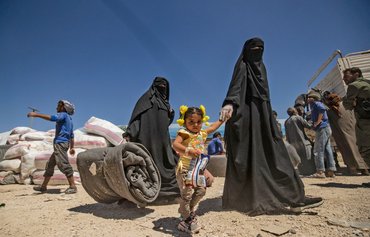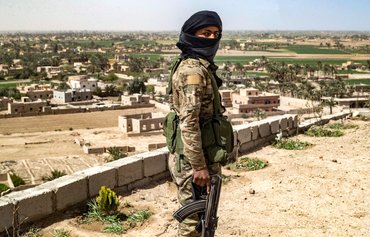Recent clashes between an Iran-backed militia allied with the Syrian regime and Kurdish forces in the northern city of al-Hasakeh are hampering the fight against the "Islamic State of Iraq and the Levant" (ISIL), observers tell Diyaruna.
In mid-August, clashes broke out in the city between the Asayish -- Kurdish security forces -- and the pro-regime National Defense Forces (NDF), a militia that Iranian Quds Force commander Qassem Soleimani was instrumental in creating.
Fighting escalated August 16th when regime warplanes bombarded Kurdish-held positions in the city for the first time.
Airstrikes, shelling and snipers operating in residential areas caused dozens of casualties and led to a mass exodus of residents towards Amouda and Qamishli.
Such clashes have slowed the territorial gains Kurdish People's Protection Units (YPG and YPJ) and allied forces are making against ISIL in northern Syria, officials and observers on the ground tell Diyaruna.
The current instability also has opened the door to ISIL attacks, they said, such as a suicide bombing Monday (September 5th) in al-Hasakeh in which a man on a motorbike killed six Asayish fighters and two civilians.
The regime's aggressive posture in al-Hasakeh is fueled by Iran, observers say, noting that the Iranian regime is interested in prolonging the Syrian conflict to ensure its ability to exert influence in Syrian affairs.
Hampering the war on ISIL
While the YPG, the Syrian Democratic Forces (SDF) and allied opposition factions are focused on fighting ISIL, the Syrian regime and NDF have created a number of problems in al-Hasakeh, YPG officer Farhad Khoja told Diyaruna.
Al-Hasakeh's administration and Asayish forces have tried to resolve these issues to avert further escalation with the regime, which controls parts of al-Hasakeh, he said.
"Kurdish forces have refrained from attacking regime and regime-allied forces as they are fighting ISIL on numerous fronts north of Kobani and do not want to open additional fronts," he said.
But the situation "exploded when the regime's militia attempted to advance towards the Kurdish areas in al-Hasakeh on August 17th, accompanied with artillery shelling and air raids that killed and wounded dozens".
"Kurdish forces were able to control several regime locations, causing significant losses to them in terms of men and equipment," Khoja said, adding that YPG and Asayish forces completely surrounded the zones under regime control.
Kurdish forces pressed towards the areas under regime control, including "security square" and the western neighbourhoods of Eastern Nashwa, Gweiran and Zuhoor, he said.
There is an increasing fear that battles between the Kurdish and regime forces will spread to more than one area, he added, particularly in Qamishli, which also has seen an escalation of violence this year.
The support Iran's Islamic Revolutionary Guard Corps (IRGC) has provided to the Syrian regime, "and the fact that they are pushing it to engage in these confrontations will affect, one way or another, the war launched by the YPG and the SDF on ISIL", Khoja said.
"Any side battles fought by these forces, which are supported by the international coalition, will weaken the ongoing efforts," he said, noting that some of the forces battling ISIL will need to be moved to the new fronts.
A swift resolution of the al-Hasakeh battles is essential, he said, so the SDF and YPG do not get caught up in a "war of attrition", but rather return to their positions on the frontlines against ISIL.
“It is not in Iran’s interest that ISIL and other groups be taken out," Khoja said. "This way, Syria will remain ignited and Iran’s intervention, together with its full control over the regime and the areas under its control, will remain as is."
A tense time in al-Hasakeh
The situation in al-Hasakeh province has been tense, with regular attempts by regime and allied militias to provoke Kurdish residents, social activist and National Peace Council member Ammar Saleh told Diyaruna.
"These provocations were rejected by local residents in light of the ethnic composition of the area, where Arabs, Kurds and Syriacs intermingle," he said.
The recent shelling and sniping was not restricted to military centres as the regime claimed, he said, but also included neighbourhoods inhabited by all of the area's ethnic groups, not just Kurds.
"This confirms the enmity of the regime towards all Syrians," he said, noting that efforts are under way to stop the fighting and secure a truce.
Meanwhile, life has been difficult for al-Hasakeh residents, said Ocalan Sheikhi, a relief worker at the Turkish-Syrian border, telling Diyaruna that electricity has been cut off amid the fighting, and traffic to and from the city has been halted.
"This caused a shortage of some essential food supplies necessary for everyday life, and this prompted residents to flee from the city," he said, estimating that tens of thousands of Arab and Kurd residents have fled, many on foot.
"Relief organisations are trying to provide basic items to the displaced, most of whom are currently sheltering in private homes," he said, adding that if the situation continues to deteriorate, displacement camps will become necessary.
At least 60 people have been killed in the clashes, he said, including 30 civilians and number of children. At least 200 civilians and military personnel were injured, many of whom were maimed in the early days of the fighting which witnessed random acts of artillery shelling and sniping.

![A Kurdish fighter uses a mirror to detect the movement of rival forces during fighting in the northern Syrian city of al-Hasakeh. [Photograph courtesy of Roj Ava Facebook page]](/cnmi_am/images/2016/09/13/6178-Syria-hasakeh-kurdish-600_384.jpg)







The article writer doesn't understand politics or war.
Reply1 Comment(s)